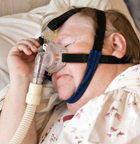
Elderly women with sleep apnea had an 85% higher risk of developing mild cognitive impairment or dementia than elderly women without sleep apnea, a new study found.
Researchers from Brigham and Women’s Hospital in Boston studied a group of 298 women, roughly a third of whom had been diagnosed with sleep-disordered breathing. The average age of women in the group was 82.
Sleep-disordered breathing, which causes the brain to be deprived of oxygen, was defined as 15 sleep apnea events per hour of sleep. At the beginning of the study, none of the participants had been diagnosed with dementia. All of the participants underwent overnight sleep studies between 2002 and 2004.
Five years after the study, investigators conducted cognitive function tests designed to detect brain health and cognitive impairment. They found that 45% of study participants with sleep apnea developed cognitive impairments, compared with 31% of women without sleep apnea. Investigators said up to 60% of elderly people suffer from sleep-disordered breathing, which means addressing apnea may boost cognitive health.
“This is one of those rare, positive and hopeful articles. If the abnormalities in getting oxygen are what’s causing the damage to the brain, it’s a potentially reversible or preventable problem,” said Gary Kennedy, M.D., a geriatric psychiatrist who was not involved in the study.
The study was published Aug. 10 in the Journal of the American Medical Association.



